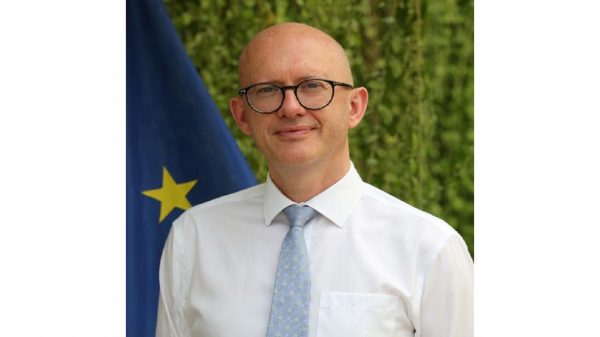EU to remain “steadfast partner” of Bangladesh on Rohingya front: Envoy

Shawdesh Desk:
Head of Delegation of the European Union (EU) to Bangladesh Ambassador Charles Whiteley has said they will continue to be a “steadfast partner” of Bangladesh in meeting the needs of the Rohingya and the host community with continued pressure on Myanmar for their safe return to their place of origin in Rakhine State.
“Clearly, I think, the majority of the Rohingya do want to go back to home,” he told UNB in an interview mentioning that everyone, including the government of Bangladesh, underlined that any return has to be “voluntary and safe” for the refugees.
Responding to a question on the EU’s business link with Myanmar, the EU envoy said they are very careful when it comes to the economy as some people say why the EU does not suspend the Everything But Arms (EBA) scheme.
Myanmar has been a member of the World Trade Organization (WTO) since 1995 and, as a least developed country, benefits from the EBA scheme, which grants unilateral duty- and quota-free access for all exports, except arms and ammunition, to the EU.
Ambassador Whiteley said Myanmar military does not have any interest in garment factories in Myanmar and the women and garment workers benefit from the industry a bit like Bangladesh. “So, what we don’t want to do is to impose measures that punish the innocent people of Myanmar who already suffered a great deal as a result of recent events in Myanmar,” he said.
The envoy made it clear that any step to address the economic and financial ties has to take into account the human cost. “I think that’s well-understood in Bangladesh.”
Appreciating Bangladesh’s generosity in hosting over 1.1 million Rohingyas, the Ambassador said the whole world was moved when Prime Minister Sheikh Hasina said they are feeding over 160 million people of Bangladesh and they can also feed the Rohingyas. “It’s very moving and humane statement.”
The envoy said they are doing all they can in the EU to put pressure on Myanmar but the situation in Myanmar is very difficult which is evolving all the time as they no longer have a civilian in the government.
He said they have put three rounds of sanctions on Myanmar targeting dozens of individuals and economic entities.
In June, the European Council imposed sanctions on eight individuals, three economic entities and the War Veterans Organisation in relation to the military coup staged in Myanmar on February 1, and the ensuing repression against peaceful demonstrators.
Calling for Accountability
The Ambassador said accountability is the key issue as crimes against humanity have taken place and they are putting a lot of support to that end. “We’re calling for accountability to happen in a meaningful way.”
While the EU is waiting for the repatriation to happen, Whiteley said, it is important to ensure that children without a future are given a future with education and skills.
“It’s very pleasing to see that there’re moves to reinstate education using the Myanmar curricula, mobilize support for livelihood skills,” he said, adding that when they go back, they will be in a position to reestablish their lives back in Myanmar.
The Ambassador said they are trying to work with the United Nations and with the government of Bangladesh to encourage that process.
Last week, European Commissioner for Humanitarian Aid and Crisis Management Janez Lenarcic visited Bangladesh and shed light on the Rohingya crisis and the prospect of their return to Myanmar.
Lenarcic said the EU will do its part and it has decided to increase their humanitarian assistance by additional 12 million euro of which 10 million euro for the Rohingyas and host community in Bangladesh while 2 million Euros will go to Myanmar for displaced people in Rakhine State.
“This requires additional engagement of the international humanitarian community, including the donor agencies and the government authorities of Bangladesh, to continue to provide support to the Rohingya community,” said the European Commissioner.
On October 26, Bangladesh and the EU met for their fourth diplomatic consultations in Brussels and both sides stressed the need for voluntary, safe, dignified and sustainable return of Rohingyas to Myanmar.
They welcomed the signing of the Memorandum of Understanding between the government of Bangladesh and the UNHCR relating to Bhasan Char.
The EU reiterated its appreciation for the generous role and action of the people and government of Bangladesh for continuing to temporarily host over 1.1 million forcibly displaced Rohingyas from Myanmar for more than four years.
The Bangladesh side thanked the EU for its political and humanitarian support in the aftermath of the crisis.
The EU raised the importance of providing perspectives to the largely young population of the forcibly displaced Rohingyas, especially in terms of education, improved livelihoods and of ensuring safety and security.























Leave a Reply